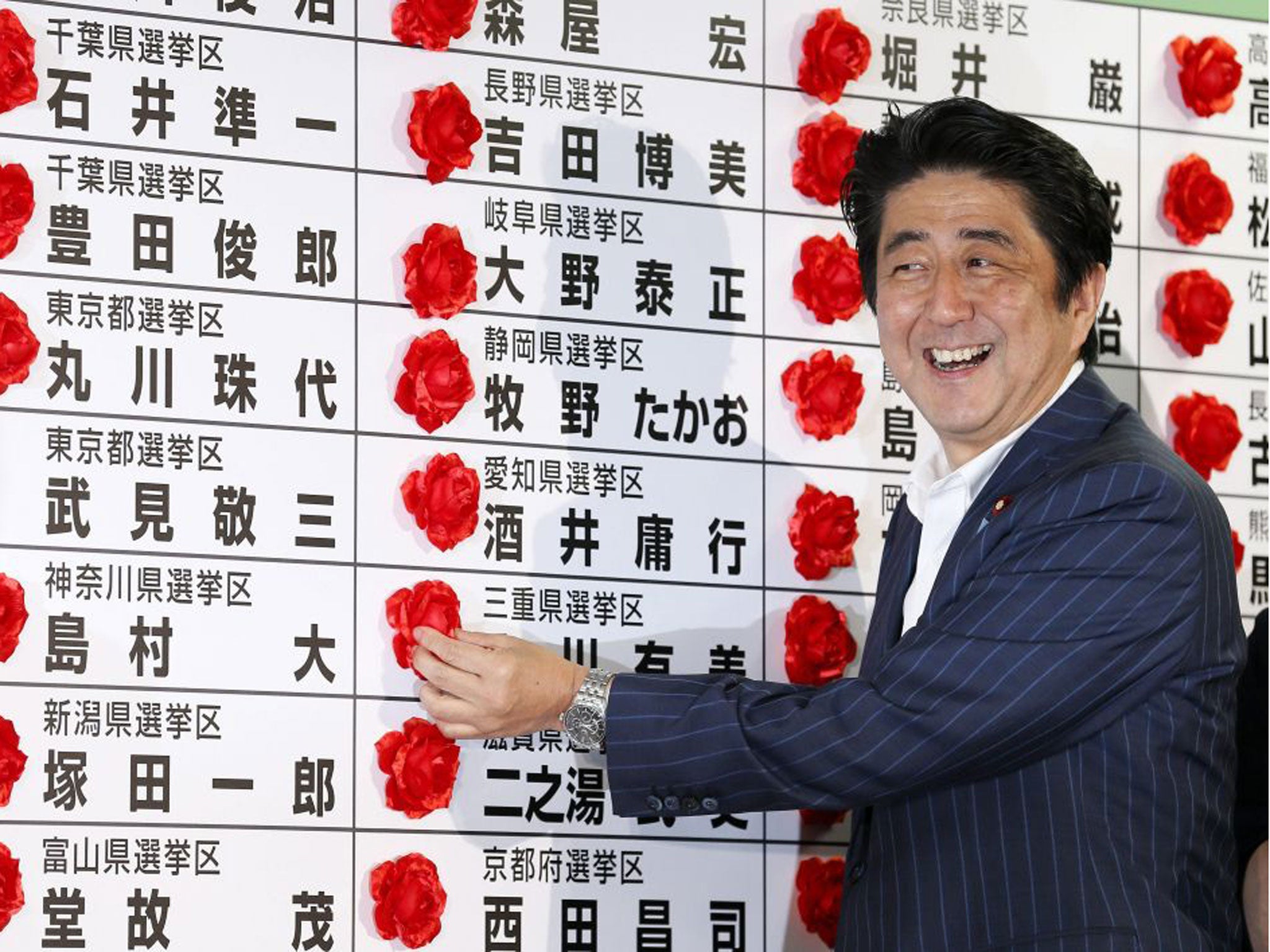Japan election: Prime Minister Shinzo Abe hails landslide win

Voters have handed Prime Minister Shinzo Abe a resounding victory in Japan’s general election, ending a gridlocked parliament and giving him one of the strongest political mandates for a Japanese leader in years.
Mr Abe says he will use the mandate to pull Japan’s giant economy out of its long-term decline. But opposition politicians fear the right-wing premier will pursue a narrow nationalist agenda that could destabilise the world’s most dynamic economic region.
State broadcaster NHK predicted that Mr Abe’s Liberal Democrats (LDP) would take at least 71 of the 121 seats up for grabs in today’s upper house poll with coalition partner New Komeito. A win, on a low turnout, would give the LDP control over both houses for the first time in six years.
Speaking on national television on Sunday, the Prime Minister promised to be “humble” in victory. “I believe the public has responded to our economic policies,” he said. “The next step is to make sure that people see their lives really improve.”
Since returning to office in December, Mr Abe has been credited with reviving the world’s third-largest economy, thanks to steroid-packed inflationary policies that have boosted public works and flooded the market with about $130bn (£85bn) in stimulus money.
Dubbed “Abenomics”, the policies have pushed up Japan’s stock market by about 60 per cent and weakened the yen by nearly a quarter, creating a rare feel-good mood among the business community.
Mr Abe’s government had an approval rating of roughly 60 per cent going into the election, high for a political system that has burned through seven prime ministers in as many years. But his policies are a high-wire act, designed to trigger more investment and consumer spending that has largely yet to materialise. The measures have increased Japan’s already huge public debt, currently at around 240 per cent of GDP.
The LDP says it will also accelerate the re-starting of Japan’s largely mothballed nuclear reactors, ignoring criticism that it is too soon after the Fukushima disaster of 2011.
Mr Abe, whose grandfather was minister and suspected war criminal during the Second World War, has deep nationalist roots. He has spent much of his two-decade political career playing down Japan’s wartime atrocities and advocating a radical conservative agenda that includes dismantling Japan’s pacifist constitution and upgrading the military.
Some analysts predict that with the election in the bag, Mr Abe will accelerate this revisionist agenda, with unpredictable results on Tokyo’s already frayed ties with giant neighbour China. The two sides are locked into a dispute over a clump of islands on Japan’s southwest fringes, known as the Senkakus in Japan and the Diaoyus in China. Mr Abe said during the election he will not “give an inch” on the dispute.
The state-run China Daily newspaper said today’s victory will encourage the Abe government to strengthen its “hawkish stance”. “It is likely to make more provocative moves over the Diaoyu Islands to seek public support to amend the constitution and upgrade self-defence forces to an army,” said an analyst quoted in the paper.
Tokyo’s game of brinkmanship with Beijing could be further complicated by a Chinese plan to dramatically expand gas drilling near a disputed border in the East China Sea.
Today’s poll will leave the Democratic Party of Japan, the largest pre-election party in the upper house, with just 14-21 seats, according to NHK. That would be its worst result since the party was founded 15 years ago.
The pacifist, anti-nuclear New Komeito is set to win 10 seats. It has been a brake on Mr Abe’s nationalist instincts in the past, triggering speculation that the LDP might pull out of the coalition if it secures a large enough victory.
Subscribe to Independent Premium to bookmark this article
Want to bookmark your favourite articles and stories to read or reference later? Start your Independent Premium subscription today.

Join our commenting forum
Join thought-provoking conversations, follow other Independent readers and see their replies